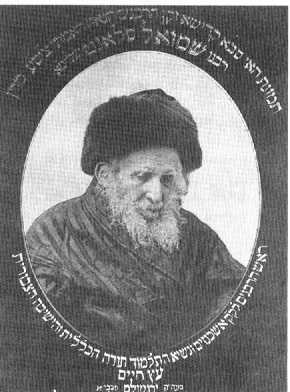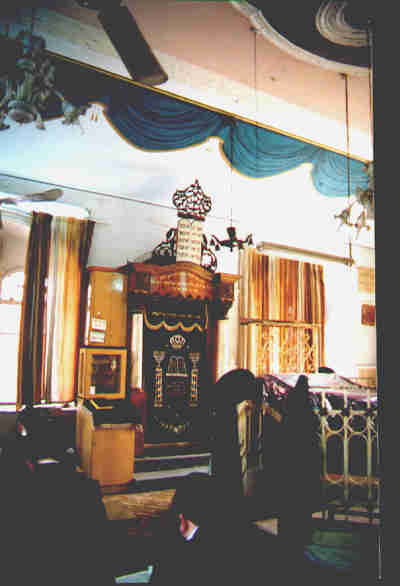|
The Innocent Thief
© by Dovid Rossoff
A FEW WEEKS before Pesach, 1885 (5645), Jerusalemites were earnestly
preparing for the festival. Every Jewish home was cleaned from top to bottom, as every
crumb of chametz (bread which is forbidden on Passover) was meticulously
sought out. Even though most families faced overcrowded and uncomfortable living
conditions, everyone was uplifted with an undeniable sense of rejuvenation.
Yet this year a certain anxiety could be felt
in the air. Funds from the Diaspora were overdue, and extra cash was essential for added
expenses of the festival. Those Jerusalemites connected with Kollel Minsk (an organization
of former resident of Minsk, Russia) turned to their gabbai, (synagogue beadle) Rav
Shlomo Zalman Porush. He reassured them that the funds would arrive any day and that he
would personally notify them and allocate the money as soon as it came.
Rav Shlomo Zalman was a remarkable man.
Besides his work with Kollel Minsk, he supervised Chevras Shaarei Chesed, the city’s
free loan society. His reputation as one of the foremost gabbai tzedakah (charity
collectors) in the city was impeccable, and his home in the new suburb of Zichron Tuvia
was open day and night for the poor and downtrodden. Rav Porush had a keen interest in
every communal project, large and small. A man of the times, he poured all of his energies
into his people and into his city. As the days passed, he personally felt the distress of
each member of the Kollel.
With no other choice, Rav
Shlomo Zalman approached one of his neighbors, Reb Feivish Stoller, for a loan. Reb
Feivish, a semi-retired carpenter, had saved his pennies over the years and had
accumulated a substantial amount of money. He immediately agreed to lend the full 200
napoleons until the money arrived from Russia. Rav Shlomo Zalman wrote him an IOU, received the
cash, and immediately divided it among the kollel members.
A few days later the long-awaited funds
arrived, together with a note saying that only 110 napoleons were included in this
dispatch and that the remainder would be forthcoming in a few weeks.
Rav Porush went to his neighbor and gave him
the money he had received. He apologized that the other 90 napoleons would be a few more
weeks in coming. Reb Feivish replied that that would be fine. To Rav Shlomo Zalman’s
later regret, he neglected to get a receipt for the amount he had just returned.
The rest of the money arrived after Pesach.
Rav Shlomo Zalman knocked on his neighbor’s door and presented it to him.
“What!” exclaimed Reb Feivish.
“But where are the other 110 napoleons?”
“Don’t you remember, my dear friend,
that I returned that sum to you before Pesach?”
“No. In fact,” Reb Feivish asserted,
“I’m absolutely certain you never returned me any of the loan until today.”
Rav Shlomo Zalman stared at his neighbor in
total disbelief. He knew that Reb Feivish’s memory was weak due to his age, yet 110
napoleons was a gigantic sum of money. Slowly, Rav Shlomo Zalman tried to help Reb Feivish
to recall the transaction between them, but to no avail. The conversation ended with Reb
Feivish demanding they resolve their disagreement in a rabbinic court.
Not long after, they stood before the rabbinic
court of Rav Shmuel Salant. Rav Shlomo Zalman admitted he received the loan of 200
napoleons, but claimed he returned 110 of them several weeks earlier, without getting a
receipt from Reb Feivish. In turn, Reb Feivish claimed he never received the 110 napoleons
and that the entire amount was still due him.
The court ruled that if Rav Shlomo Zalman took
a Torah oath, a very grave matter, that he had indeed paid the 110 napoleons, he would
only have to return the remaining 90. Otherwise, he would have to pay the full amount. Rav
Shlomo Zalman asked permission to consider what to do, and was granted three days.
Rav Porush was in a quandary. Never in his
life had he uttered a Torah oath, and he was petrified just thinking about it. Yet
everything he had said was true. He was not a thief, G-d forbid. Finally, he made up his
mind.
“I have made my choice,” he said
before the judges. “I will pay the money and not swear. I only ask permission to
repay it over a long period of time.”
Reb Feivish consented, and the two parties
turned to leave the court room.
Suddenly they heard Rav Shmuel Salant call
out, “No! This case is not yet closed!”
The two men returned and stood before the
court.
Looking at Rav Shlomo Zalman, Rav Salant said,
“This case is not a personal case between two individuals. It is a communal case.
Even though you claim your innocence, you will taint your image as the upright gabbai
tzedakah of the city by paying the money. People will no longer view you as a true
leader of the community. Therefore, I obligate you to swear before the court that you
paid, and uphold your integrity.”

Rav Shlomo Zalman felt his heart pounding.
“Please give me some time to reconsider,” he muttered.
The next few days were like Tisha b’Av,
the somber period of mourning the destroyed Temple, for Rav Shlomo Zalman. He recited
Psalms endlessly and mulled over the words of the rabbinic court.
Finally he reappeared before the court and
consented to take the oath.
When he returned home he announced to his
family that he was putting his house up for sale.
“Why?” they asked.
“When I first agreed to pay the money, I
planned to sell our house and buy a smaller one. I intended to take the difference and pay
Reb Feivish. Though I have sworn and am free of paying the money, I don’t think it is
fair of me to derive any pleasure from it. Therefore I want to continue with my plan, but
instead of giving it to Reb Feivish I will consecrate it for a noble cause.”
Before he could sell his house, Reb Feivish
appeared breathlessly at his door. In his hand was the lost money bound in its original
satchel. He accidentally found it that morning in the back corner of his closet, having
deposited it there and completely forgotten about it. He begged Rav Shlomo Zalman to
forgive him for all the trouble he had caused. Overjoyed, Rav Porush forgave him
wholeheartedly.
Reb Feivish announced that he did not want to
keep the money for himself. Instead, he sought to consecrate it for a holy purpose. At
that time, the new suburb of Beit Yisrael was planning to build a synagogue, but sorely
lacked funds. Reb Feivish decided to donate the 110 napoleons for the construction of the
Beit Yaakov Synagogue.
The new synagogue was dedicated in 1887
(5647), and an engraved stone was put on the northern wall. In compliance with Reb
Feivish’s wishes, there is no mention of his name. Instead, it reads: “This
synagogue was built by a generous man who prefers to remain anonymous. He donated 110
napoleons....”
When you are in Israel, be sure to drop in and
see it.
The author and his family has lived in
Jerusalem for over twenty-five years. He has written Land of Our
Heritage, Safed: The Mystical City, and The Tefillin Handbook. He has just published a new book When Heaven Touches Earth about the Jewish history of Jerusalem
from the Crusader period until the present.
~~~~~~~
from the March 1999 Passover Edition of the Jewish Magazine
|
